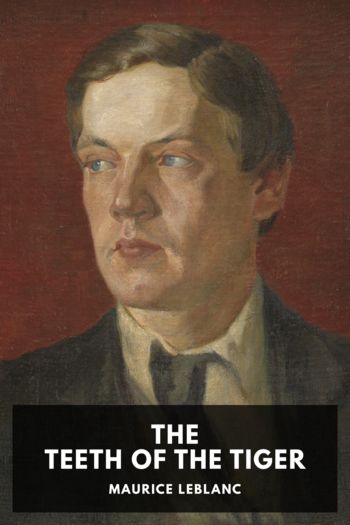The Golden Triangle, Maurice Leblanc [epub e reader .txt] 📗

- Author: Maurice Leblanc
Book online «The Golden Triangle, Maurice Leblanc [epub e reader .txt] 📗». Author Maurice Leblanc
Old Siméon had listened without speaking, with his head still half wrapped up, showing only his bristly gray beard and his eyes hidden behind their yellow spectacles. But at this point of the story he gave a little chuckle, came up to Patrice and said in his ear:
“There’s something to fear … to fear! … Mme. Coralie. … Make her go away at once … make her go away. … If not, it’ll be the worse for her. …”
Patrice shuddered and tried to question him, but could learn nothing more. Besides, the old man did not remain. A policeman came to fetch him and took him to the library.
His evidence lasted a long time. It was followed by the depositions of the cook and the housemaid. Next, Coralie’s evidence was taken, in her own room. At four o’clock another car arrived. Patrice saw two gentlemen pass into the hall, with everybody bowing very low before them. He recognized the minister of justice and the minister of the interior. They conferred in the library for half an hour and went away again.
At last, shortly before five o’clock, a policeman came for Patrice and showed him up to the first floor. The man tapped at a door and stood aside. Patrice entered a small boudoir, lit up by a wood fire by which two persons were seated: Coralie, to whom he bowed, and, opposite her, the gentleman who had spoken to him on his arrival and who seemed to be directing the whole enquiry.
He was a man of about fifty, with a thickset body and a heavy face, slow of movement, but with bright, intelligent eyes.
“The examining-magistrate, I presume, sir?” asked Patrice.
“No,” he replied, “I am M. Masseron, a retired magistrate, specially appointed to clear up this affair … not to examine it, as you think, for it does not seem to me that there is anything to examine.”
“What?” cried Patrice, in great surprise. “Nothing to examine?”
He looked at Coralie, who kept her eyes fixed upon him attentively. Then she turned them on M. Masseron, who resumed:
“I have no doubt, Captain Belval, that, when we have said what we have to say, we shall be agreed at all points … just as madame and I are already agreed.”
“I don’t doubt it either,” said Patrice. “All the same, I am afraid that many of those points remain unexplained.”
“Certainly, but we shall find an explanation, we shall find it together. Will you please tell me what you know?”
Patrice waited for a moment and then said:
“I will not disguise my astonishment, sir. The story which I have to tell is of some importance; and yet there is no one here to take it down. Is it not to count as evidence given on oath, as a deposition which I shall have to sign?”
“You yourself, captain, shall determine the value of your words and the innuendo which you wish them to bear. For the moment, we will look on this as a preliminary conversation, as an exchange of views relating to facts … touching which Mme. Essarès has given me, I believe, the same information that you will be able to give me.”
Patrice did not reply at once. He had a vague impression that there was a private understanding between Coralie and the magistrate and that, in face of that understanding, he, both by his presence and by his zeal, was playing the part of an intruder whom they would gladly have dismissed. He resolved therefore to maintain an attitude of reserve until the magistrate had shown his hand.
“Of course,” he said, “I daresay madame has told you. So you know of the conversation which I overheard yesterday at the restaurant?”
“Yes.”
“And the attempt to kidnap Mme. Essarès?”
“Yes.”
“And the murder? …”
“Yes.”
“Mme. Essarès has described to you the blackmailing scene that took place last night, with M. Essarès for a victim, the details of the torture, the death of the colonel, the handing over of the four millions, the conversation on the telephone between M. Essarès and a certain Grégoire and, lastly, the threats uttered against madame by her husband?”
“Yes, Captain Belval, I know all this, that is to say, all that you know; and I know, in addition, all that I discovered through my own investigations.”
“Of course, of course,” Patrice repeated. “I see that my story becomes superfluous and that you are in possession of all the necessary factors to enable you to draw your conclusions.” And, continuing to put rather than answer questions, he added, “May I ask what inference you have arrived at?”
“To tell you the truth, captain, my inferences are not definite. However, until I receive some proof to the contrary, I propose to remain satisfied with the actual words of a letter which M. Essarès wrote to his wife at about twelve o’clock this morning and which we found lying on his desk, unfinished. Mme. Essarès asked me to read it and, if necessary, to communicate the contents to you. Listen.”
M. Masseron proceeded to read the letter aloud:
“Coralie,
“You were wrong yesterday to attribute my departure to reasons which I dared not acknowledge; and perhaps I also was wrong not to defend myself more convincingly against your accusation. The only motive for my departure is the hatred with which I am surrounded. You have seen how fierce it is. In the face of these enemies who are seeking to despoil me by every possible means, my only hope of salvation lies in flight. That is why I am going away.
“But let me remind you, Coralie,





Comments (0)